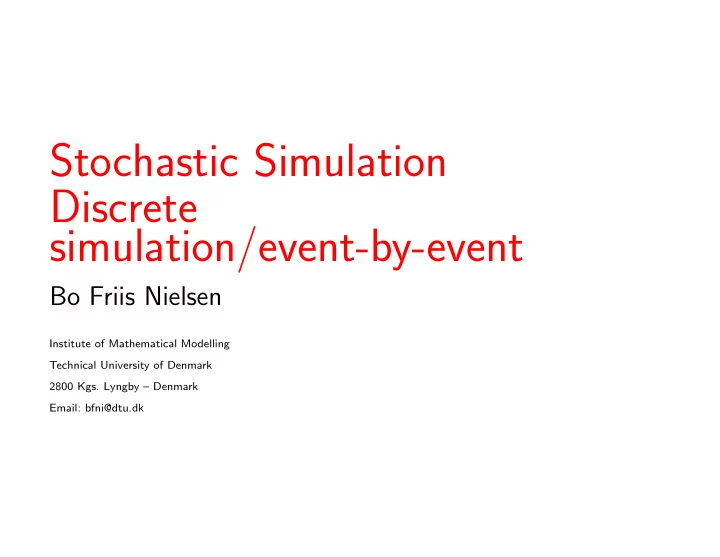

Stochastic Simulation Discrete simulation/event-by-event Bo Friis Nielsen Institute of Mathematical Modelling Technical University of Denmark 2800 Kgs. Lyngby – Denmark Email: bfni@dtu.dk
Discrete event simulation Discrete event simulation • Continuous but asynchronous time • Systems with discrete state-variables ⋄ Inventory systems ⋄ Communication systems ⋄ Traffic systems - (simple models) • even-by-event principle DTU 02443 – lecture 5 2
Elements of a discrete simulation Elements of a discrete simulation language/program language/program • Real time clock • State variables • Event list(s) • Statistics DTU 02443 – lecture 5 3
The event-by-event principle The event-by-event principle • Advance clock to next event to occur • Invoke relevant event handling routine ⋄ collect statistics ⋄ Update system variables • Generate and schedule future events - insert in event list(s) • return to top DTU 02443 – lecture 5 4
Analysing steady-state behaviour Analysing steady-state behaviour • Burn-in/initialisation period ⋄ Typically this has to be determined experimentally • Confidence intervals/variance estimated from sub-samples DTU 02443 – lecture 5 5
Queueing systems Queueing systems • Arrival process • Service time distribution(s) • Service unit(s) • Priorities • Queueing discipline DTU 02443 – lecture 5 6
Buffer S(t) A(t) • A ( t ) - Arrival process • S ( t ) - Service process (service time distribution) • Finite or infinite waiting room • One or many serververs • Kendall notation: A ( t ) /S ( t ) /N/K ⋄ N - number of servers ⋄ K - room in system (sometime K only relates to waiting room) DTU 02443 – lecture 5 7
Performance measures Performance measures • Waiting time distribution ⋄ Mean ⋄ Variance ⋄ Quantiles • Blocking probabilities • Utilisation of equipment (servers) • Queue length distribution DTU 02443 – lecture 5 8
S = X + ..... + X n 1 n N(t) X 6 X 5 X 4 X 3 X 2 X 1 * * * * * DTU 02443 – lecture 5 9
Poisson process Poisson process • Independently exponentially distributed intervals P ( X i ≤ t ) = 1 − e − λt • Poisson distributed number of events in an interval. Number of events in non-overlapping intervals independent N ( t ) ∼ P ( λt ) ⇔ P ( N ( t ) = n ) = ( λt ) n n ! e − λt • If the intervals X i are independently but generally distributed we call the process a renewal process DTU 02443 – lecture 5 10
Sub-samples - precision of estimate Sub-samples - precision of estimate • We need sub-samples in order to investigate the precision of the estimate. • The sub-samples should be independent if possible • For independent subsamples the standard deviation of our estimate will be proportional to √ n − 1 DTU 02443 – lecture 5 11
Confidence limits based on sub-samples Confidence limits based on sub-samples • We want to estimate some quantity θ • We obtain n different (independent) estimates ˆ θ i . • The central limit theorem motivates us to construct the following confidence interval: � n � i =1 ˆ � n θ i 1 ¯ ˆ i − n ¯ � S 2 θ 2 θ 2 θ = θ = n n − 1 i =1 � θ + S θ θ + S θ � ¯ 2 ( n − 1); ¯ √ nt α √ nt 1 − α 2 ( n − 1) DTU 02443 – lecture 5 12
Confidence limits based on sub-samples - Confidence limits based on sub-samples - based on normal distribution based on normal distribution � θ + S θ θ + S θ � ¯ 2 ; ¯ √ nu α √ nu 1 − α 2 DTU 02443 – lecture 5 13
General statistical analysis General statistical analysis • More generally we can apply any statistical technique • In the planning phase - experimental design • In the analysis phase ⋄ Analysis of variance ⋄ Time-series analysis ⋄ . . . DTU 02443 – lecture 5 14
Recommend
More recommend